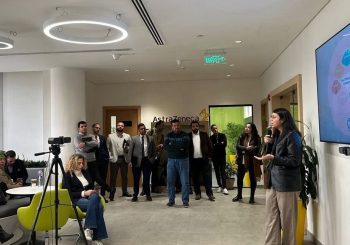In Egypt, a new wave of professionals is trading conventional employment for the flexibility of freelance work.
Traditionally, employment in Egypt was characterized by stable, long-term positions within established companies, often accompanied by benefits such as pensions and health insurance.
However, this model is evolving.
The rise of freelance and gig work reflects a shift towards more flexible, project-based employment, where individuals can choose their clients and projects, often at the cost of stability and benefits.
The shift is part of a broader trend, with the gig economy gaining traction worldwide because of its many benefits. These include employees choosing their clients and projects, as well as having more control over their careers and schedules. Many workers are opting for freelance roles to escape the constraints of conventional jobs according to an article published by Forbes.
It is important to distinguish between freelancing and remote work; while both provide flexibility, freelancing typically involves project-based work for various clients, whereas remote work may still tie individuals to a single employer. The term gig economy refers to a labor market characterized by short-term contracts and freelance work as opposed to permanent jobs.
According to a 2017 report by the International Labour Organization (ILO), the freelance economy has grown significantly worldwide to six percent, driven by factors such as economic uncertainty the global financial crisis of 2008–09 had brought along with COVID and the desire for flexible work arrangements.
In Egypt, this movement has been accelerated by the rising foreign currency exchange rate, which has driven up the cost of living as prices for imported goods have soared.
The foreign currency exchange rate has caused inflation, rendering basic necessities less affordable and contributing to financial instability for many families.
Additionally, the growing acceptance of remote work during the COVID-19 lockdown catapulted freelancing into the spotlight, prompting local professionals to seek freelance opportunities without the commitment of office employment, according to Egypt’s Information Technology Industry Development Agency (ITIDA).
Current estimates suggest that freelancing is becoming increasingly prevalent in Egypt.
In April 2023, Egyptian Minister of Information Communication Technology Amr Talaat suggested that 47 percent of the global workforce is engaged in self-employment as freelancers, totaling approximately 1.5 billion individuals. He also noted that 30 percent of Egypt’s workforce is self-employed
Omar Ehab, a 25-year-old graphic designer, finds himself captivated by the freedom that freelancing offers.
“I love being able to choose my projects,” he tells Egyptian Streets. “It’s great to have the chance to collaborate with clients who inspire me.”
Having studied design at university, Ehab initially worked a corporate job but soon realized that the conventional office environment stifled his creativity.
“I felt boxed in,” he explains. “But, after making the leap to freelancing, I discovered a world where I could express myself fully.”
For Ehab, freelance offered both creative expression and freedom of movement.
However, he is also acutely aware of the unpredictability that comes with freelance income.
“Some months are incredibly busy, while others can be quite slow,” he adds.
This fluctuation pushes Ehab to be resourceful, often saving during peak periods to manage leaner months.
“I’ve learned to budget and plan ahead,” he explains, noting the need for financial discipline.
The gig economy fosters a culture of entrepreneurship, encouraging individuals to take charge of their professional careers. Freelancers often develop diverse skill sets that enhance their employability and adaptability in a rapidly changing job market.
Ehab expresses this sentiment of unity, stating, “Sharing experiences and advice with fellow freelancers has been crucial,” underscoring the importance of community support in navigating the ups and downs of freelance life.
For Abdelrahman Rabie, a 28-year-old voice-over freelancer, freelancing serves as a gateway to diverse opportunities. “I get to work on everything from commercials to audiobooks,” he explains
With a background in theater, Abdelrahman transitioned to voice-over work to explore new avenues for his talent.
“It allows me to use my voice in ways I never imagined,” he enthusiastically says.
However, he too acknowledges the challenges of inconsistent earnings.
“There are times when I’m swamped with work, and others when I’m waiting for new gigs,” he notes.
The financial unpredictability can be daunting, especially when it comes to financial planning. To navigate this, Abdelrahman emphasizes the importance of networking and building relationships within the industry.
“I attend events and workshops to meet potential clients and other freelancers,” he tells Egyptian Streets.
Yassin Ahmed, a 34-year-old video editor, embraces freelancing as a chance to tell compelling stories. He initially worked in a traditional media company, but felt constrained by rigid deadlines and creative limitations.
“I wanted to work on projects that resonate with people,” he explains.
By stepping into the freelance world, Yassin has the freedom to select projects that align with his values and artistic vision. However, Yassin also faces the pressures of client acquisition.
“It takes time to establish a reputation and find consistent work,” he admits.
The competitive nature of the industry means that he must continually refine his skills and adapt to new trends.
“I’ve started exploring social media content creation to diversify my offerings.”
The experiences shared by Ehab, Rabie, and Ahmed illustrate the complex relationship between freelance work and job security in Egypt. While they appreciate the creative freedom and diverse opportunities that freelancing provides, they are also conscious of the instability that can accompany it.
As the gig economy continues to grow, it represents both a challenge and an opportunity for many professionals navigating a rapidly changing job landscape. The balance between flexibility and financial security remains a key consideration for those choosing this path.







Comments (0)